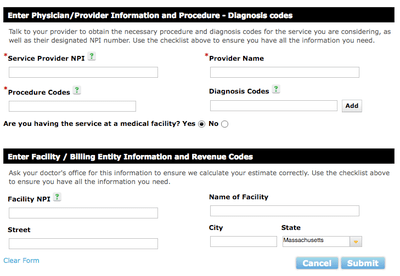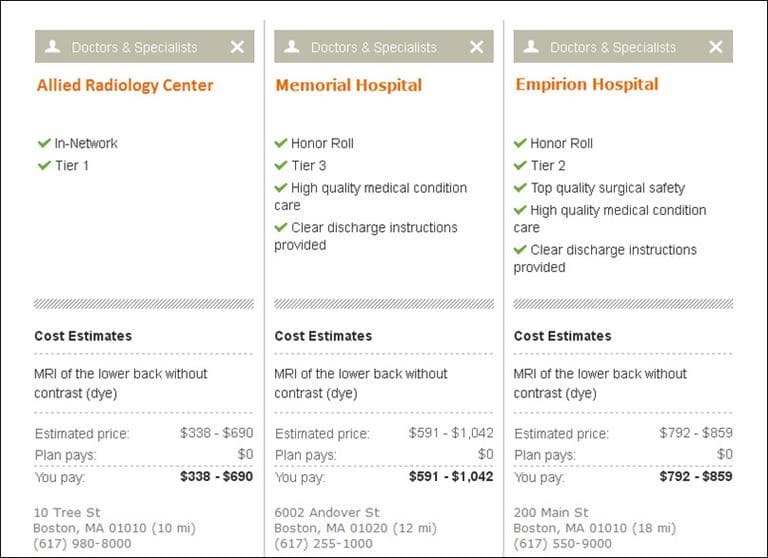Advertisement
In Mass., You Can Now Get Prices For Health Care In Advance (But It's No T.J. Maxx)

“How much will my MRI cost?” It sounds like a simple question. But before Oct. 1, it was very difficult to get an answer.
Now, Massachusetts is pulling back the curtain on what has been a largely secret world of health care prices. A new state law says health insurers must be able to tell members, in advance, how much a test, treatment or surgery will cost. The idea is to help patients become health care shoppers — especially patients who have to pay a lot out of pocket before their insurance kicks in.
Phone Calls And Forms
I threw out my back last week and went to the doctor. She sent me down the hall for X-rays. I may need more. So, I was curious: How much does an X-ray cost? I called my insurer, Blue Cross.
The recorded message didn’t mention health care prices, so I went with, "For all other inquires, press 0."
On came Jamie D. (customer service reps don’t give out their last names) and I explained that I wanted to compare the price of lower back X-rays at a few different facilities.
"Absolutely," Jamie said. "Do you know the name of the provider you’re going to be working with?"
I had the doctor’s name, but I didn't have most of the other information Jamie wanted. Blue Cross, Harvard Pilgrim and Tufts Health Plan will ask you for lots of details before giving you an estimate.
Blue Cross, for instance, wants the procedure and/or diagnostic codes (CPT or ICD-9) for each X-ray I may need, my doctor’s National Provider Identifier (NPI) and the name, address and NPI for my hospital or lab, so it can consolidate all the charges into one estimate.
"Typically with the X-rays there’s going to be a charge for the provider who renders the X-ray and then who’s reading it," Jamie explained, "so it’s like a professional and a facility charge."
Jamie directed me to an online form. I called my doctor and got the information. Twenty minutes later I clicked submit, and that was for just one lab. If I wanted to compare prices, I’d have to fill out separate forms for each one. Once I’d submitted all the correct information, Blue Cross had 48 hours to get me an estimate. I guess it goes without saying I’d never do this in an emergency.
So far, it didn't feel like shopping. The main point of this new requirement is to help patients make smarter choices. We're supposed to start behaving more like consumers of health care. So where’s the instant gratification I get from finding a designer sweater for $16.99 at T.J. Maxx?
Insurers' Concerns
Insurers aren’t thinking that way. They all sound a little overwhelmed by trying to put a price tag on medical care.
"The challenge is really about trying to make this information personalized and useful," said Derek Abruzzese, vice president for strategy and product development at Tufts Health Plan. "Unfortunately, you know, health care is very complex and so it’s difficult to make things simple, straightforward and precise."
So many things can change when patients actually go in for treatment.
"You know, they needed an extra lab, an extra MRI or some sort of diagnostic that [neither] we, nor the member or the provider for that matter, could have foreseen at the time that estimate was requested," said Bill Gerlach, director of member decision support at Blue Cross Blue Shield of Massachusetts.
Insurers are also worried about getting the price right because the new state health cost control law puts insurers on the hook if their estimates are wrong.
"If we show an estimate that is lower and someone goes and pays more, then we are liable. We're working very hard ... to be accurate," said Sue Amsel, who is working on a new health care shopping tool that Harvard Pilgrim Health Care hoped to have up and running this month.
Harvard Pilgrim’s site is delayed until later this fall. Tufts' shopping tool won't be ready until the spring. Both are providing estimates over the phone for now.
Blue Cross has a cost estimator for its PPO members and will expand the tool to HMO members early next year. But unlike Tufts and Harvard Pilgrim, Blue Cross will only offer binding estimates for members who fill out a form online or call the 1-800 member line.
In the meantime, Amsel has a demo of Harvard Pilgrim's "Now I Know" site (see below).
"I’m going to just click on MRI," Amsel said, showing me on my laptop. Next, she selected a body part, in this case the brain. A new page popped up that showed how much a Harvard Pilgrim member, with a high deductible plan, would have to pay for the most common brain MRI at different hospitals around Boston.
"Here you see that your range is from $372 to $1,223," she said. Amsel says that kind of range, where one hospital is paid three to four times more for the same test, is not unusual.
Okay, this is not as exciting as my bargain sweater, but Amsel says people who have to spend a lot of their own money before insurance picks up the tab need to know how much their care will cost.
"We know that people are frustrated," she said. "They go to the doctor not knowing, they come back with a big bill that they didn’t expect. They weren’t able to prepare for it, they weren’t able to plan for it, so I think this will help them quite a bit."
Your insurer should spell out what’s included and what’s not in the estimate you receive. Pay close attention to what is not part of the estimated price, because you may have to pay for any extras.
A new era is dawning in Massachusetts. We can find out, in advance, how much everything from a blood test to open heart surgery costs. The requirement for insurers began Oct. 1; the same rule takes effect for hospitals in January. But in these early days, getting an accurate price still isn’t quick or easy.
-- Heres a demo screengrab of the cost calculator Harvard Pilgrim hopes to have ready this fall:

Listen to the audio version of this story below:
This program aired on October 8, 2013. The audio for this program is not available.
